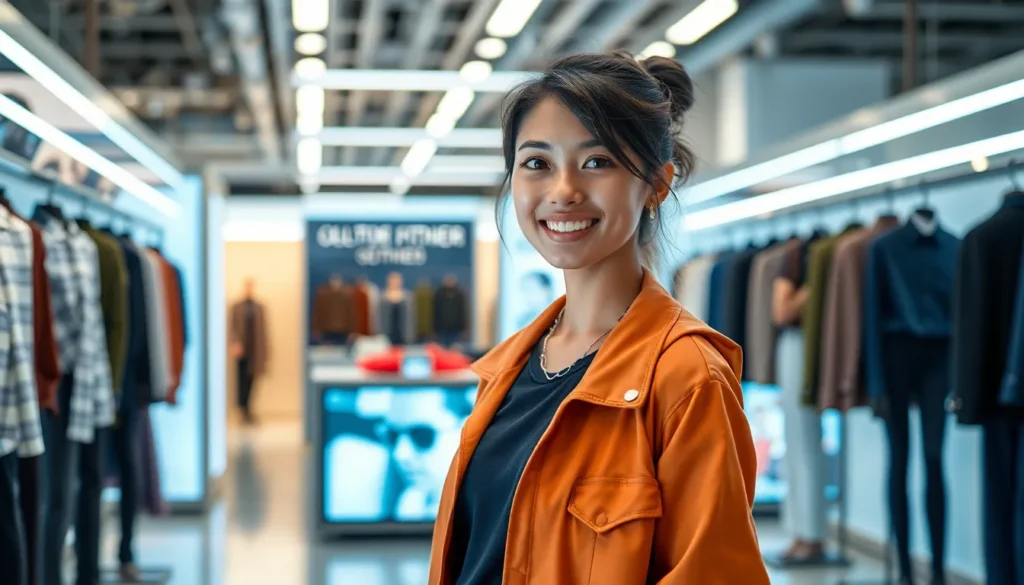Imagine slipping into a shirt that knows your style better than your best friend. Welcome to the world of artificial intelligence clothing brands, where fashion meets futuristic tech. These innovative labels are not just stitching fabric together; they’re weaving algorithms and data into every thread, creating garments that adapt to individual tastes and preferences.
Table of Contents
ToggleOverview of Artificial Intelligence Clothing Brands
Artificial intelligence clothing brands merge technology with fashion, creating a unique shopping experience. These brands utilize algorithms to analyze consumer data, allowing for personalized recommendations and tailored garments. They incorporate machine learning to predict trends and styles, ensuring collections remain relevant and appealing.
Innovative designs emerge from the integration of AI in the creative process. For instance, companies like Stitch Fix and Unmade leverage AI to enhance product offerings based on customer feedback and preferences. This approach allows for rapid adaptation to changing market demands, giving brands a competitive edge.
Customization options provided by AI enhance consumer engagement. Many brands now offer virtual fitting rooms that use augmented reality to help customers visualize clothes before purchasing. Shoppers experience increased satisfaction when they find pieces that fit their exact measurements and styles.
Data analytics play a crucial role in managing supply chains for these brands. By forecasting demand accurately, AI technology reduces waste and optimizes inventory levels. Efficient production processes contribute to sustainable practices, which attract environmentally conscious consumers.
Brands adopting artificial intelligence also ensure better customer support. Chatbots and virtual assistants enhance the shopping experience by offering assistance 24/7, answering queries, and providing style suggestions. As a result, consumers enjoy a seamless blend of technology and fashion in their purchasing journey.
Overall, artificial intelligence clothing brands redefine retail by integrating advanced technology. Shoppers benefit from personalized experiences, while brands maintain relevance in a competitive landscape.
Key Features of AI-Driven Fashion

AI-driven fashion brands showcase innovations that redefine consumer experiences and product offerings. They utilize technology to create clothing that resonates with individual preferences.
Personalized Shopping Experience
Personalization stands at the forefront of AI-driven fashion. Algorithms analyze consumer behavior and style preferences, offering tailored recommendations. Individualized shopping experiences foster loyalty by making the process more enjoyable. Joining this trend, companies implement interactive quizzes to determine customer styles. Enhanced suggestions not only streamline the selection process but also improve conversion rates. Chatbots assist with inquiries and provide styling tips, ensuring continuous engagement. Brands that prioritize these strategies can effectively cater to diverse consumer needs.
Smart Fabric Technology
Smart fabric technology reshapes how clothing interacts with its wearer. Materials embedded with sensors monitor variables such as body temperature and moisture. These fabrics can adjust to varying conditions, offering comfort and utility. In addition, some smart clothes integrate health monitoring features, allowing users to track fitness metrics. AI algorithms analyze data collected from these fabrics to optimize their functionality over time. This innovation appeals to consumers who value both fashion and wellness. Brands that adopt smart fabric technology stand out by offering unique, multifunctional clothing options.
Popular Artificial Intelligence Clothing Brands
Several brands have emerged, showcasing innovative approaches in the marriage of artificial intelligence and fashion.
Brand A: Innovations and Offerings
Stitch Fix stands out for its use of AI-driven algorithms to curate personalized clothing selections. Utilizing a detailed quiz, customers provide style preferences, allowing the brand to predict ideal fits and styles. The data feedback loop from consumers enhances product offerings, making them more aligned with current trends. Personalized styling services update regularly based on user interaction. This commitment to innovation ensures that customers receive relevant items, thereby increasing satisfaction and loyalty.
Brand B: Sustainability Focus
Unmade prioritizes sustainability through on-demand production technology. By leveraging AI, the brand reduces waste commonly associated with traditional fashion manufacturing methods. Customers can participate in the design process, which leads to unique, custom garments. The emphasis is on producing only what is needed, which aligns with growing environmental concerns in the fashion industry. Additionally, using recycled materials strengthens their commitment to eco-friendly practices. Such strategies appeal to environmentally conscious consumers seeking guilt-free fashion choices.
Brand C: Unique Design Perspectives
Alo Yoga incorporates AI to create adaptive activewear that meets various fitness needs. Each piece uses smart technology to monitor wearer’s performance, offering insights through a connected app. Consumers experience a blend of functionality and style, setting them apart from traditional activewear brands. Engaging customers with unique designs draws in those looking for fashionable yet practical solutions. This unique approach helps the brand connect with a diverse audience seeking both aesthetic and utilitarian benefits.
Impact of AI on the Fashion Industry
Artificial intelligence significantly transforms the fashion industry, affecting production processes and consumer interactions.
Enhanced Production Efficiency
Automation speeds up garment production, reducing lead times for brands. Predictive analytics ensure that designers create garments aligned with consumer demand. Data-driven insights help optimize inventory management, minimizing overproduction and waste. Enhanced collaboration between AI technologies and human designers produces innovative solutions for sustainable practices. Improved supply chain management streamlines logistics, resulting in more efficient operations across the industry. Brands leveraging AI experience higher operational efficiency, which ultimately drives down costs.
Redefining Customer Engagement
Personalization becomes the hallmark of AI-driven strategies in fashion. Tailored recommendations based on browsing history and preferences elevate the shopping experience. Interactive tools such as AI-generated quizzes guide consumers toward clothing that suits their style. Brands utilize virtual assistants to provide real-time support, enhancing satisfaction throughout the buying journey. Community-building features foster brand loyalty through personalized communication and exclusive offers. Customization options increase customer engagement, ensuring that each individual feels valued by the brand.
The rise of artificial intelligence clothing brands marks a significant shift in the fashion industry. By leveraging technology to enhance personalization and sustainability, these brands are reshaping how consumers engage with fashion. The integration of smart fabrics and advanced algorithms not only meets individual preferences but also addresses broader environmental concerns.
As the industry evolves, the emphasis on data-driven insights and innovative customer experiences will likely continue to grow. Brands that embrace AI technology stand to gain a competitive edge, fostering loyalty and satisfaction among their customers. The future of fashion is undoubtedly intertwined with artificial intelligence, promising exciting developments ahead.

